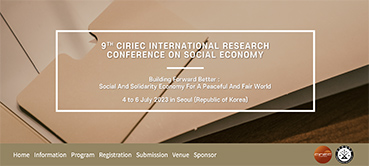CIRIEC invites you to its ‘IX International Research Conference on Social Economy, which will be held from 4 to 6 July 2023 in Seoul (South Korea), at Sungkonghoe University. The aim of this conference will be to share with academics, other researchers and social economy players their research by contributing to issues such as: social and environmental transition, reconstruction, democratic governance, impact measurement, green transformation, as major global issues.
The event is organised by Sungkonghoe University in Seoul, affiliated member of CIRIEC, in close collaboration with CIRIEC-International. The general theme of the conference is ‘Building Better: Social and Solidarity Economy for a Peaceful and Fair World’.
CIRIEC has published the call for abstracts for the 9th conference. Researchers interested in presenting papers should submit a abstract of their paper (300 word max) by 31 January 2023: http://bit.ly/3F7rezo . Notification of accepted abstracts will be made by email by 1 March 2023.
After acceptance by the Scientific Committee, final versions of papers (only in English) must be submitted by 11 June 2023. More information on the conference website.
Eight International research conferences world congresses of researchers have been organised to date: the first in 2007 in Victoria (Canada), the second in 2009 in Östersund (Sweden), the third in 2011 in Valladolid (Spain), the fourth in 2013 in Antwerp (Belgium), the fifth in 2015 in Lisbon (Portugal), the sixth in 2017 in Manaus (Brazil), the seventh in 2019 in Bucharest (Romania) and the eighth in September 2021 in Costa Rica, with an attendance of between 300 and 600 people at each edition.
About the theme of the Congress
As Sungkonghoe University explains, in the last two years, the disparities between rich and poor and the wealth gap between nations have deepened, aggravated also by the impacts of the COVID-19 pandemic.
Meanwhile, fear of war and conflict is growing in many parts of the world. Recent years have shown that major threats to social cohesion and to the future of our planet can arise. For CIRIEC the way to address all this is through the social and solidarity economy (SSE).
CIRIEC recalls that the SSE has been highlighted as an alternative growth model in the UN Secretary General’s Report on “The socially just transition to sustainable development” (UN, 2021). This model aims to “strike a new balance between economic efficiency and social and environmental resilience,” which “fosters economic dynamism, social and environmental protection and socio-political empowerment” (UNTFSSE, 2021). Conflicts stem from unmet human needs and aspirations, while poverty eradication, social inclusion and cohesion help to build a peaceful society.
Cooperatives and social economy organisations respond to human needs and aspirations, including ambitions for a better, more sustainable, more participatory and more prosperous future for all. Unfortunately, the contribution of the social economy is not yet adequately measured worldwide. Even so, it can be said that social economy organisations ” play a key role in peace building and post-conflict transition, fostering community development”, according to CIRIEC.







